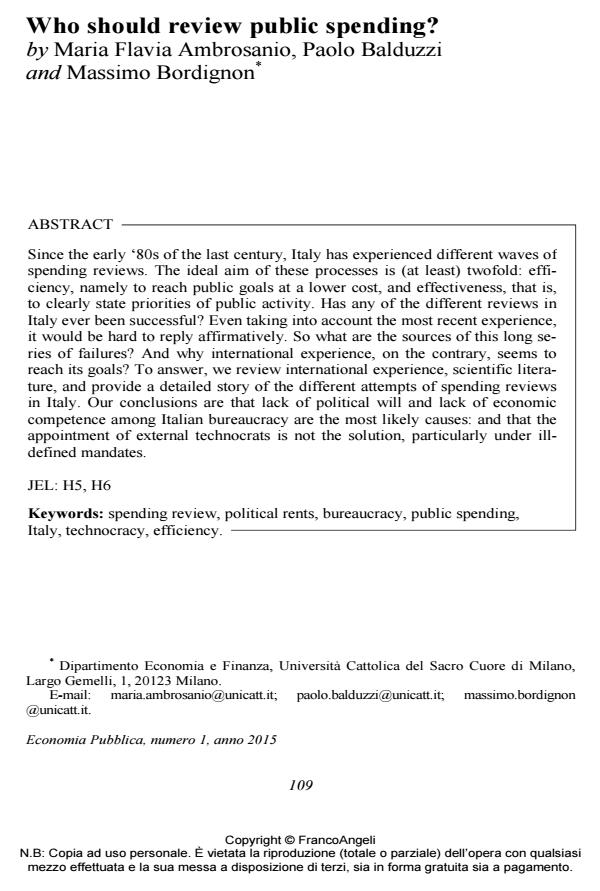Who should review public spending?
Journal title ECONOMIA PUBBLICA
Author/s Maria Flavia Ambrosanio, Paolo Balduzzi, Massimo Bordignon
Publishing Year 2015 Issue 2015/1 Language English
Pages 19 P. 109-127 File size 176 KB
DOI 10.3280/EP2015-001005
DOI is like a bar code for intellectual property: to have more infomation
click here
Below, you can see the article first page
If you want to buy this article in PDF format, you can do it, following the instructions to buy download credits

FrancoAngeli is member of Publishers International Linking Association, Inc (PILA), a not-for-profit association which run the CrossRef service enabling links to and from online scholarly content.
Since the early ‘80s of the last century, Italy has experienced different waves of spending reviews. The ideal aim of these processes is (at least) twofold: efficiency, namely to reach public goals at a lower cost, and effectiveness, that is, to clearly state priorities of public activity. Has any of the different reviews in Italy ever been successful? Even taking into account the most recent experience, it would be hard to reply affirmatively. So what are the sources of this long series of failures? And why international experience, on the contrary, seems to reach its goals? To answer, we review international experience, scientific literature, and provide a detailed story of the different attempts of spending reviews in Italy. Our conclusions are that lack of political will and lack of economic competence among Italian bureaucracy are the most likely causes: and that the appointment of external technocrats is not the solution, particularly under illdefined mandates.
Keywords: Spending review, political rents, bureaucracy, public spending, Italy, technocracy, efficiency.
Jel codes: H5, H6
- Alesina A., Tabellini G. (2007). Bureaucrats or Politicians? Part I: A Single Policy Task. American Economic Review, 97: 169-179. DOI: 10.1257/aer.97.1.169
- Alesina A., Tabellini G. (2008). Bureaucrats or Politicians? Part II: Multiple Policy Tasks. Journal of Public Economics, 92: 426-447. DOI: 10.1016/j.jpubeco.2007.06.004
- Austen-Smith D., Banks J.S. (1996). Information Aggregation, Rationality, And The Condorcet Jury Theorem. American Political Science Review, 90: 34-45. DOI: 10.2307/2082796
- Austen-Smith D., Feddersen T. (2006). Deliberation, Preference Uncertainty, And Voting Rules. American Political Science Review, 100: 209-218. DOI: 10.1017/s0003055406062113
- Balduzzi P., Graziano C., Luporini A. (2011). Voting in Corporate Boards With Heterogeneous Preferences. CesIfo Working Paper No. 3332.
- Balduzzi P., Graziano C., Luporini A. (2014). Voting in Small Committees. Journal of Economics, 111: 69-95. DOI: 10.1007/s00712-012-0321-5
- Besley T., Ghatak M. (2005). Competition and Incentives with Motivated Agents. American Economic Review, 95: 616-36. DOI: 10.1257/0002828054201413
- Dekel E., Piccione M. (2000). Sequential Voting Procedures in Symmetric Binary Elections. The Journal of Political Economy, 108: 34-55. DOI: 10.1086/262110
- Doraszelski U., Gerardi D., Squintani F. (2003). Communication And Voting With Doublesided Information. Contributions to Theoretical Economics, 3: 1-39. DOI: 10.2202/1534-5971.1084
- European Commission (2014). Public Spending Reviews. Design, Conduct, Implementation. European Economy/Economic Papers No. 301
- Hart O., Moore J.H. (2005). On the Design of Hierarchies: Coordination versus Specialization. Journal of Political Economy, 113: 675-702. DOI: 10.1086/431794
- Iayczower M., Lewis G., Shum M. (2013). To Elect or to Appoint? Bias, Information, And Responsiveness of Bureaucrats And Politicians. Journal of Public Economics, 97: 230-244. DOI: 10.1016/j.jpubeco.2012.08.007
- Li H., Rosen S., Suen W. (2001). Conflicts And Common Interests In Committees, American Economic Review, 91: 1478-1497. DOI: 10.1257/aer.91.5.1478
- Lim C.S.H. (2013). Preferences and Incentives of Appointed and Elected Public Officials: Evidence from State Trial Court Judges. American Economic Review, 103: 1360-1397. DOI: 10.1257/aer.103.4.1360
- OECD (2012). International Budget Practices and Procedures Survey.
- OECD (2013). Spending reviews, 3rd annual meeting of OECD Senior budget officials, OECD Conference centre, Paris, 3-4 June 2013.
- Ottaviani M., Sørensen P. (2001). Information Aggregation In Debate: Who Should Speak First? The Journal of Public Economics, 81: 393-421. DOI: 10.1016/s0047-2727(00)00119-5
- Visser B., Swank O. (2007). On Committees of Experts. Quarterly Journal of Economics, 122: 337-372. DOI: 10.1162/qjec.122.1.33
Maria Flavia Ambrosanio, Paolo Balduzzi, Massimo Bordignon, Who should review public spending? in "ECONOMIA PUBBLICA " 1/2015, pp 109-127, DOI: 10.3280/EP2015-001005